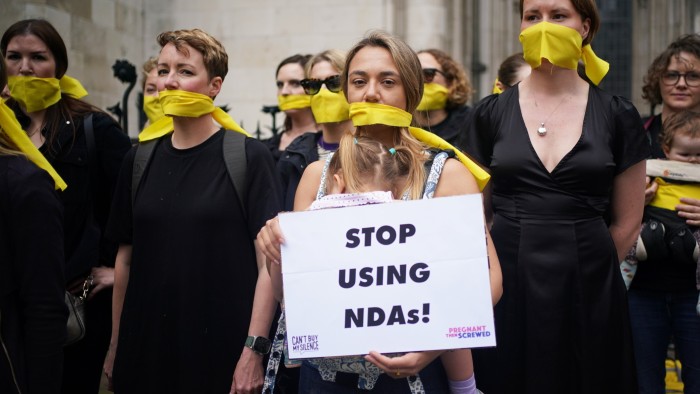Unlock Editor’s Digest Lock for Free
FT editor Roula Khalaf will select your favorite stories in this weekly newsletter.
The UK government is taking steps to curb employers’ use of “nausea clauses” to cover workplace harassment in a series of changes defended by whistleblowers at the heart of the Harvey Weinstein scandal.
The government-supported amendments to the Employment Rights Bill would void and invalidate private contracts if employers use them against harassed employees, including sexual harassment or discrimination, the government said.
The provision also said the government announced the change on Monday that it would allow for “calls” without the threat of being sued for harassment.
This amendment does not affect the wider use of NDAs, for example, as it prevents workers from disclosing commercially sensitive information.
Employment Minister Justin Mudders said the change “gives confidence that inappropriate behavior in the workplace is not hidden.”
“This change has been a very long time,” said Zelda Perkins, a former British assistant to film producer Weinstein, who stuck to the NDA situation for 20 years before making a statement in 2017.
“For decades, confidentiality clauses have been used to cover up harassment and discrimination. Finally, the government acknowledges the harm it carries out not only to individuals but to the entire workplace,” she added.
The term NDA can refer to any contract that includes confidentiality or non-inheritance clauses, including those used to protect intellectual property, but is often used by an employer when resolving claims filed by an employee.
In the wake of the Weinstein scandal, previous conservative-led administrations have issued new guidance on the use of the NDA to clarify that it cannot be used to prevent workers from reporting criminal offences.
But that prevents the clause from being banned, and campaigners say the lack of legal clarity means they still had a calm impact on the victims.
A 2024 investigation by the CIPD Employer Group found that more than a fifth of organizations claiming to have used NDAs in dealing with sexual harassment allegations have spread.
Media company ITN is one of those people being scrutinized following allegations that NDA use of legal agreements to cover gender pay discrimination, harassment and bullying.
Labour MP Louise Hay, who campaigned for the NDA ban, said the amendment covering both employees and self-employed people would allow people to speak freely and make organizations “facing fraud.”
Recommended
It is still possible for employees to request an NDA if it helps them to reach a negotiated settlement with their employer, she added.
The Employment Rights Bill, introduced by the Labour Government, is a set of changes that will strengthen the rights of workers and unions.
The law also included measures to enhance whistleblowing protections and encourage workers to speak about sexual harassment through whistleblowing routes, the government said.
Additional Reports by Antonia Cundy

